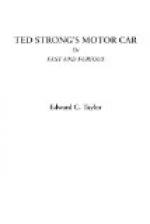As he did so, a shot rang out, and a ball sped close to his head.
The room was so dense with suffocating powder smoke that he could not see across it, but he had seen the dull-red flash from the muzzle of a revolver and shot in that direction.
“I’m done,” he heard, followed by a deep groan.
“Get me out of here,” said a man, trying to struggle to his feet, and Ted hurried to his side. It was one of the detectives, and Ted helped him to his feet and supported him to the hall.
“Let me down. I’ve got mine. Go in and help Dunnigan,” said the wounded man. There was a spot, red and ever widening, on his breast.
Ted laid him on the floor and reentered the room. Another shot came in his direction, and missed, although he could feel the wind of it as it passed close to his head, and he returned it with two shots, and there was silence.
The smoke had by this time cleared away somewhat, and Ted saw five men lying prone in the room.
One of the detectives lay on his face across the bed, and Ted tried to raise him up, but he was a dead weight. Ted finally got him turned over on his back, and then he saw that the detective was dead.
Kneeling on the floor with his head in his arms, which were thrown across a chair, was the third detective. He was breathing hard, and every time he moved the blood gushed from his mouth. He had been shot through the stomach.
But on the other side of the bed lay three men, apparently all of them dead.
While he was observing this there was a commotion in the hall, and a policeman rushed in, followed by a large man who wore an authoritative air.
“Oh, this is too bad; this is too bad,” he kept repeating, as he went from man to man. It was Chief of Detectives Desmond. Turning to the policeman, he said:
“They’ve killed the boys, but the boys got the whole gang except two, ‘Checkers’ out there, and a man in the red automobile.”
CHAPTER XVI.
The man in the yellow car.
A patrol wagon full of policemen had dashed up in front of the house, and they came running down the hall, followed by a horde of eager reporters, who stood aghast at the slaughter of a few minutes.
The only participant in the fight who could talk was the detective whom Ted had carried to the hall, and he was telling the chief of detectives in whispers what had occurred.
“That young fellow followed us in,” he said, pointing to Ted. “He took me out, and then went in and finished the gang. He’s a game one, he is. I don’t know who he is, but, by Jove! he’s a game un.”
“Who were the gang?” asked the chief.
“‘Big Bill’ Minnis, ‘Bull’ Dorgan, and ‘Feathers’ Lavin,” was the reply. “Checkers we caught on the corner, and the other member of the gang, Dude Wilcox, got away. I guess it was him that rode off with the swag in the automobile, but where he went we couldn’t get.”




